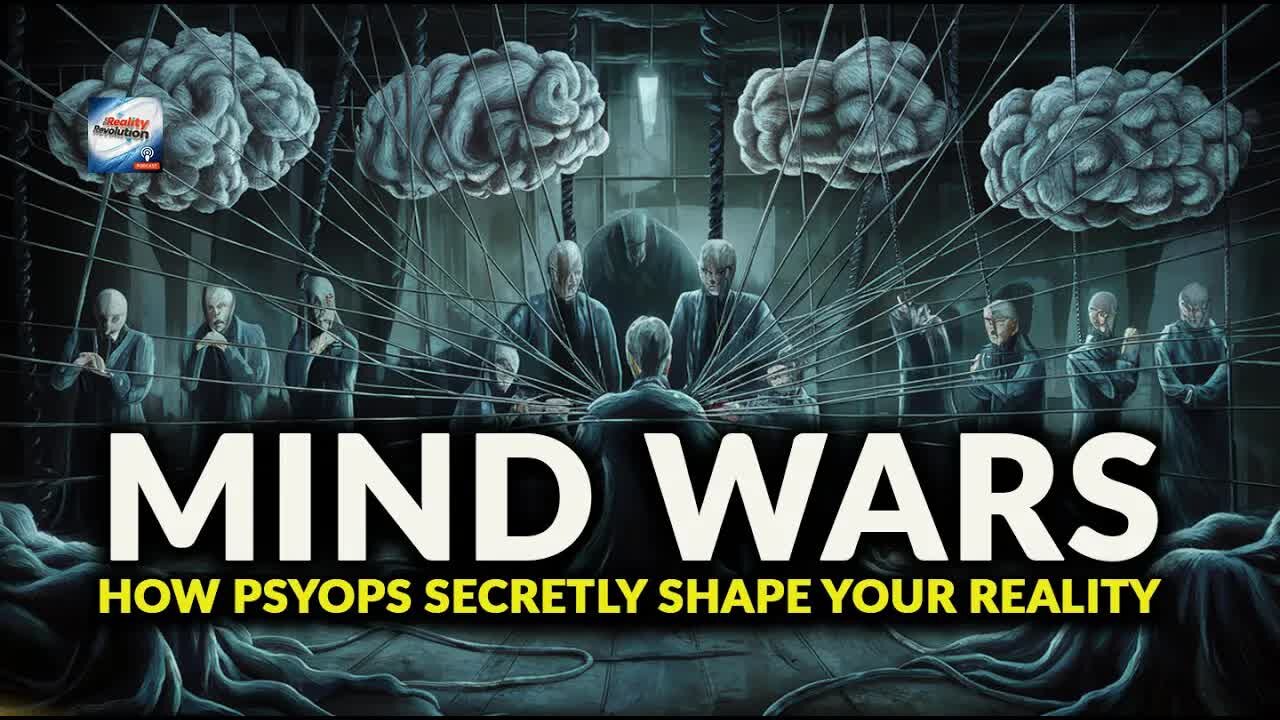Premium Only Content

Mind Wars & Psyops (Brian Scott)
Source: Brian Scott
Mind Wars - How Psyops Secretly Shape Your Reality
https://youtu.be/zA4dfq5vtfA
Welcome to the Reality Revolution, I'm your host, Brian Scott.
Psyops. If you're like me, you've heard that word a lot lately. It's a word that's being thrown around more and more, so it's a sign.
Psyop is a term relegated to the shadowy corners of military strategy and covert operations, but now suddenly has burst into the collective consciousness with unprecedented force.
Today, it's not just specialists in dark rooms who are talking about psychological operations. It's a topic of conversation in living rooms, online forums, and across social media platforms worldwide.
This surge in awareness reflects a growing recognition of the unseen forces shaping your perceptions, beliefs, and decisions.
As we navigate this new reality, with the lines between information and manipulation blur, understanding Psyops is no longer optional.
It's essential.
No, I'm not bragging, and I can't go into too much detail, but this is a topic I know a lot about, that I have expertise in. I've kind of talked about it in previous episodes. We've talked about pendulums and the way that pendulums can affect you, but under all that is Psyops. And right now, it's more than likely that you are completely being manipulated by some form of psychological operation. If I'm going to teach you how to create your reality, if I'm going to discuss consciousness with you, I have to discuss this topic.
And you may not know that you're being manipulated, and your reality most likely is being created by these psychological operations. In an age where information is as vital as air and water, the manipulation of perceptions and beliefs has become an invisible, yet pervasive force shaping societies.
Psychological operations, or Psyops, are the strategic use of information to influence the behavior, emotions, and decision-making processes of both individuals and groups.
This episode delves into the shadowy realm of Psyops, exploring their roots, mechanisms, and the profound impact they wield on the global stage and in history. Psyops are not a novel invention of the digital era.
They trace back to ancient times, evolving from the deceptive tactics of war to sophisticated campaigns that leverage psychology, technology, and mass media. In contemporary society, Psyops extend beyond the battlefield, infiltrating the daily lives of ordinary people, often without their awareness.
The rise of social media, digital platforms, and advanced technologies has amplified the reach and effectiveness of Psyops, making it imperative for individuals to understand and recognize these operations.
My intention is to demystify psychological operations, offering a comprehensive exploration of their development historically, the strategies employed, and their application in various domains, including but not limited to warfare, politics, and social movements.
This is not a political episode.
All of my episodes are meant to be evergreen and are not meant to be discussing anything that's politically happening now, though it's very difficult not to. Because right now, at the time that I'm giving this episode, we are in the middle of a multiplicity of psychological operations operating at full scale in the public domain. In particular, I want to analyze the pervasive use of trauma and traumatic events that are being exploited to enact change-shift perceptions and manipulate societal narratives.
Psychological operations, or Psyops, are defined as planned operations to convey selected information and indicators to audiences to influence their emotions, motives, objective reasoning, and ultimately the behavior of governments, organizations, groups, and individuals.
The essence of Psyops lies in their ability to manipulate perceptions, creating a reality that benefits the operator, often without the target's conscious realization. This strategic use of information to achieve a desired outcome is as old as human conflicts itself, yet it has adapted over time to exploit the latest in communication technologies and psychological research. The history of psychological operations is a testament to human ingenuity, in warfare, and governance. Ancient texts like The Art of War by Sun Tzu outlined principles of deception, morale manipulation, and enemy disorientation that echo today's Psyops tactics. In the World Wars, leaflets dropped from planes and propaganda broadcasts were used to demoralize the enemy and sway neutral or opposition populations.
The Cold War era marked a significant evolution with both sides employing psychological warfare to spread ideologies and discredit opponents without firing a single shot.
Today, the digital landscape has transformed Psyops, allowing for unprecedented scale and precision in targeting individuals and communities worldwide. At the heart of Psyops lies an understanding of human psychology, how people perceive information, form beliefs, and make decisions.
The human mind is both rational and emotional.
Psyops exploit this duality by crafting messages that resonate on an emotional level, bypassing critical thinking, trauma, and fear are especially potent tools in this regard. What I find happening very often is you're involuntarily exposed to traumatic stimuli that renders the target vulnerable to false solution. In short, you start a fire in someone's head and show up with a fire truck. So think of the most horribly traumatic and terrible images that you can think of.
If you see something in war a lot of time involving kids, a lot of time implying child slavery, child abuse, the most horrific and terrible crime, they'll provide evidence for it with an image or a video in some cases that may be unrelated. But they create this sort of traumatic stimuli.
Your heart rate goes up, suddenly there's a change in your emotion, and then they provide a false solution to you. It should be illegal, right? It should be illegal to brainwash unsuspecting strangers into acting against their own self-interest to benefit yourself. At the heart of Psyops lies an understanding of human psychology, how people perceive information, form beliefs, and make decisions.
The human mind is both rational and emotional. Psyops exploit this duality by crafting messages that resonate on an emotional level. Bypassing critical thinking, trauma, and fear are especially potent tools in this regard. Traumatic events can soften psychological defenses, making individuals and populations more susceptible to influence and manipulation. By tapping into or creating traumatic experiences, Psyops can significantly alter perceptions and behaviors in ways that serve their orchestrators' objectives. Psyops vary widely in their implementation and scope, ranging from overt actions to subtle manipulations that can be broadly categorized into three things. White Psyops are operations that are overt and generally acknowledge their source.
They aim to build credibility and trust among the target audience, often resembling traditional public relations campaigns. Examples include leaflet drops in conflict zones, urging enemy soldiers to surrender or public health campaigns during a pandemic. Grey Psyops, the source of Grey Psyops, is not explicitly acknowledged, leaving the audience uncertain about the originator.
These often spread rumors, innuendos, and unverified information to create confusion and distrust among the target audience. Black Psyops, these operations are covert and aim to deceive the target audience about the source and intent of the information. Black Psyops might involve fabricating documents, creating false flag operations, or disseminating fake news stories intended to mislead, disorient, and demoralize. The advent of the internet and social media has given rise to digital misinformation campaigns, deepfakes, and algorithmic manipulation, representing the latest frontier in psychological operations. These digital tools allow for the mass customization of messages, targeting individuals based on their preferences, biases, and vulnerabilities, making modern Psyops more personal and psychologically potent than ever before.
And what I see happening is individualized Psyops on individual people. Once they have enough information about you, they can run a Psyop specifically on you. Understanding Psyops requires a grasp of their historical roots, psychological underpinnings, and the diverse tactics employed across different eras and technologies. And as we delve into this, it's important to remember that the ultimate goal of Psyops is to influence thought and action. I teach about creating a reality through thought, so if this is something happening now that has happened in the past and in the future, we have to talk about it.
You have to be aware of it.
Recognizing the signs of psychological operations in your daily life is the first step towards safeguarding your autonomy in an increasingly manipulated world. The strategic use of psychological tactics in warfare predates recorded history, manifesting in myriad forms across different cultures and epochs. One of the earliest instances can be traced back to the biblical story of Gideon, who used the fear of the unknown to defeat the Midianites, with a mere 300 men, torches, and trumpets.
Similarly, ancient Chinese military strategist Sun Tzu emphasized the importance of psychological warfare in the art of war, advocating for the use of deception, misinformation, and intimidation to weaken the enemy without engaging in physical combat. These historical anecdotes highlight the enduring recognition of the mind as a battlefield, where victory can be achieved by sowing confusion and fear among opponents. The two world wars marked the beginning of formal, systematic approaches to psychological operations. World War I saw the extensive use of propaganda posters, leaflets, and films to sustain morale at home and demoralize the enemy.
The advent of radio technology further expanded the reach of psychological tactics, with both Axis and Allied powers broadcasting propaganda to influence public opinion and disrupt enemy morale during World War II. The Cold War era witnessed a significant evolution in psyops, as the United States and the Soviet Union engaged in a battle for the hearts and minds of the global population. The United States established the United States Information Agency, USIA, and the Voice of America, VOA, to promote American values and counter Soviet propaganda.
Conversely, the Soviet Union used disinformation campaigns, such as Operation Infection, which falsely claimed the US had invented HIV/AIDS as a biological weapon, to undermine American credibility, something that they now do in the modern form of Russia all the time.
Russia is the master of psychological operations.
At least, they were, until we figured it out.
The United States employed psyops extensively using leaflets and loudspeakers and radio broadcasts in the Vietnam War to demoralize North Vietnamese and Vietcong forces. The Chu Hoi program encouraged enemy soldiers to defect, promising fair treatment and benefits despite these efforts.
The complex socio-political dynamics and resilience of Vietnamese nationalism underscored the limitations of psyops in achieving strategic objectives. The British and Argentine forces both used psychological operations in the conflict over the Falkland Islands. The BBC played a crucial role in maintaining morale among British troops and the Falkland Islanders while Argentine forces attempted to demoralize British troops through radio broadcasts. The effectiveness of British psyops in conjunction with superior military strategy and logistics contributed to the successful recapture of the islands. Psyops played a pivotal role in the US-led invasion of Iraq in 2003.
The coalition forces deployed leaflets, radio and television broadcasts to undermine the Iraqi military's will to fight, encourage defections and inform Iraqi civilians about the coalition's objectives. One notable operation involved the use of psychological tactics to convince Iraqi soldiers to surrender to unmanned aerial drones. The mixed outcomes of these operations highlighted the challenges of psyops in modern asymmetrical warfare, where winning hearts and minds is as crucial as achieving military victory.
The history of psychological operations reveals a continuous evolution of tactics designed to exploit human vulnerabilities, with the effectiveness of these operations being contingent upon cultural, historical and contextual factors.
These case studies underscore the complexity of psychological warfare and the necessity of understanding both its potential and its limitations in shaping the course of conflicts. I want to discuss trauma as a tool in psyops and go into this a little bit further. This is important. It is essential to understand the psychology of trauma and its impact on populations.
Trauma by its very nature disrupts the normal psychological functioning of individuals and communities, leaving a lasting impact on mental health, societal cohesion and collective behavior.
Psychologically trauma can shatter individuals' worldviews, making them more susceptible to influence as they seek stability in answers. On a communal level, traumatic events can lead to heightened emotions, fear and a longing for safety and leadership, conditions ripe for the application of psyops. The psychological aftermath of trauma ranging from shock and denial to anger and acceptance provides a window of vulnerability. The psychological operations can exploit to shape perceptions, spread misinformation or foster a desired behavioral change.
There are many historical and modern examples of trauma-based psyops. In World War II, the strategic bombing campaigns by both allies and Axis powers were aimed not just at crippling military infrastructure but also at demoralizing civilian populations. The psychological impact of these bombings created a climate of fear and uncertainty which leaders exploited to rally support for the war effort and demonize the enemy. Prior to and during the Rwandan genocide, radio broadcasts were used to incite hatred and violence against the Tutsi population. These broadcasts exploited the trauma intentions from past conflicts, contributing to the rapid escalation of violence and the eventual genocide. The manipulation of historical grievances demonstrated how trauma could be weaponized to mobilize populations towards horrific ends. Just look at 9/11 and the War on Terror.
The terrorist attacks on September 11, 2001 had a profound psychological impact on the United States and the world. And the trauma of these events was leveraged by various governments to garner support for military actions in the Middle East. The narrative of combating terrorism was potentiated by the collective shock and grief illustrating how national trauma can be a catalyst for significant policy shifts and military interventions. Consequences of trauma-based psyops are far-reaching and are not being discussed especially in the spiritual community. People are trying to avoid the hard issues. They are leading to the radicalization of populations, the stigmatization of groups, and the perpetuation of conflict.
Furthermore, the normalization of such tactics risks desensitizing us to the suffering of others, undermining global efforts towards peace and reconciliation. If you are a warrior of the light, then you are a warrior against psychological operations because they come from the dark. From a psychological perspective, the induction and utilization of trauma for manipulation tap into fundamental aspects of human cognition, emotion, and behavior. Understanding these processes is crucial for comprehending how individuals and groups can be influenced or controlled through deliberately induced trauma or by exploiting existing traumatic experiences. Understand that trauma can be induced in various ways, often through experiences that elicit intense fear, helplessness, or horror.
These experiences can be direct, such as through violence, threats, witnessing atrocities, or indirect through the manipulation of information and media to create a perception of imminent threat or loss. The key to inducing trauma is the creation of an environment of narrative that challenges your sense of security and predictability in the world. Psychological mechanisms used are shock and disorientation.
Sudden and intense events can cause cognitive dissonance, where individuals struggle to reconcile the event with their previous understanding of the world. This dissonance creates a psychological vacuum, making individuals very susceptible to new narratives that can explain or give meaning to their experiences. They use hyperarousal and sensitization. Trauma can lead to a heightened state of arousal, where individuals become more sensitive to threats, real or perceived.
This state can be exploited to maintain a continuous sense of fear or anxiety, making individuals more likely to seek out and adhere to protective or authoritative figures and ideologies. They use regression and dependency.
In the face of overwhelming trauma, most of us may regress to earlier stages of psychological development characterized by increased dependency. This regression can make people more susceptible to influence and control, as they look to external sources for security and guidance.
Once trauma has been induced or identified, it can be leveraged to manipulate individuals or populations in several ways. They exploit emotional responses like fear by playing on the fear generated by traumatic events, by imaginary things that are happening in the world in some cases.
Manipulators can direct anger and suspicion toward designated targets, shaping public opinion and behavior. They love to use guilt and shame by attributing blame for traumatic events.
Manipulators can induce feelings of guilt and shame, making individuals or groups more malleable to change in an attempt to atone or avoid further blame. They use solidarity and identity. Traumatic events can foster a strong sense of solidarity and identity among survivors or those affected.
This collective identity can be manipulated to unify a group against perceived enemies or to solidify loyalty to a cause or a leader. They can shape your beliefs and behavior. I continually teach that belief is the secret sauce behind manifestation.
Neville Goddard tells us it's the one thing we need to use our God power so they can shape your beliefs so they're using you to create reality. They use narrative control by controlling the narrative around a traumatic event.
Manipulators can shape individuals' understanding and memory of the event, influencing their beliefs and attitudes. They use something called normalization of extremes. In the aftermath of trauma, previously extreme or unacceptable behaviors and beliefs can become normalized as individuals seek solutions to their pain or means to prevent future trauma. This shift can be manipulated to justify radical measures, authoritarianism, martial law, or extreme ideologies that you would never accept in a normal situation. Another classic technique is inducing learned helplessness.
Prolonged exposure to trauma can lead to learned helplessness where individuals believe they have no control over their situation. This psychological state can be exploited to impose authoritarian controls or policies as individuals may passively accept conditions they would otherwise completely resist. So how do they conduct these psychological operations? There are two different kind of actors.
There's the government actor and there's the intelligence operation and in some cases corporate operation that is conducting these psychological operations. Generally you kind of know what's up when it's the government doing it. Sometimes they're more subtle about it.
They're going to use fear and intimidation, disinformation and confusion. They use the state controlled media, visible punishments of dissenters or alleged enemies. They fabricate news and create and disseminate false information, overloading information, flooding the information space with conflicting reports and narratives to overwhelm the public's capacity to discern truth from it. They use the state controlled media, visible punishments of the public's capacity to discern truth from falsehood, leading to confusion and apathy toward critical issues.
Division and conquest identify existing societal or political divisions and exacerbate them through targeted propaganda or surveillance and blackmail, dependency and reward. Those are all things that governments can do.
Intelligence operators will use infiltrating and undermining trust. They will exploit social divides. They will identify and amplify existing social, political and cultural divisions within a society and they will use targeted propaganda to deepen these rifts, employing social media platforms and other online forms to disseminate divisive content, fake news and polarizing narratives.
They will manipulate the media and information space. There are multiple different intelligence operations manipulating the mass media in the United States and the world. They establish or co-opt existing media outlets and in some cases they buy their own secretly and they spread disinformation, creating narratives that so distress in democratic institutions such as the electoral process, the judiciary and the press.
They use these channels to question the legitimacy of elected officials and to spread conspiracy theories that undermine public confidence. They promote extremism. Outside forces will covertly support extremist groups across the political spectrum, providing them with resources, information or strategic advice to escalate their activities. The goal is to create an atmosphere of chaos and violence, forcing the government to respond in ways that can be portrayed as over-reaching or oppressive.
They love to use cultural subversion, undermining the cultural and historical foundations of the society by attacking its symbols and narratives. This could involve supporting movements that seek to revise history or disparage national heroes or diminish shared values thereby eroding the sense of unity and identity. They will do everything in their power to undermine economic stability or at least your perception of economic stability. They will engage in cyber operations targeting critical economic infrastructure such as financial markets, banking systems and energy grids to create uncertainty and economic hardship.
This can lead to public discontent and diminished trust in the government's ability to secure the nation's economic well-being. They use economic leverage such as investments, bribes or blackmail to influence politicians, business leaders, thought leaders, even YouTubers and other influential figures.
The aim is to create a network of influence that can be used to steer policies in ways that weaken the society internally and externally. Right now, we are in a cyber war, cyber war one, and they are conducting cyber espionage to steal sensitive government documents, intellectual property and personal information of high-profile individuals. They leak or weaponize this information to embarrass the officials, expose secrets or blackmail them creating public scandals. They social engineer and hack using sophisticated social engineering tactics to manipulate individuals into divulging sensitive information or to gain unauthorized access to critical systems. This not only undermines security but also erodes trust in digital infrastructure.
They induce paralysis by analysis. Flood the information space with conflicting information making it increasingly difficult for the public to discern truth from falsehood. Now with AI creating fakes, it's going to happen even more, especially during any electoral process. This overabundance of information can lead to a feeling of analysis paralysis where the sheer complexity and volume of information available overwhelms the population's ability to make an informed choice. They use moral demoralization and engaging in operations designed to demoralize the population and reduce their will to resist or counteract subversive activities.
This involves highlighting or exaggerating the moral failings of societal leaders, promoting narratives of inevitable decline, or creating incidents that cause public outrage and disillusionment. This is happening all the time, on many different levels.
At the same time, I see on a given day 100 different psychological operations in place, hundreds of different pendulums using psychological operations, competing intelligence communities, as well as corporations and corporate intelligent communities. It's a new time baby, and it is crazy.
We are in World War 3, and the battlefield is not with weapons and guns, in most parts of it, it is in the mind.
The landscape of conflict has undergone a profound transformation in the digital age, transitioning from the physical battlegrounds of traditional warfare to the nuanced arenas of information and psychological operations. This shift reflects the changing nature, power, and influence in the 21st century, where control, over-information, and the ability to shape perceptions are equally, if not more, potent than military might.
In this new era, your mind, the minds of the public, has become the primary target, with psyops designed to exploit vulnerabilities in human psychology and the digital infrastructure that now underpins much of daily life. Social media is a battleground.
The proliferation of social media platforms, I have like 15 that I'm on, you can check out the description where I give you all my social media links. These platforms allow for the rapid dissemination of information and misinformation, enabling actors to manipulate narratives, sew discord, and polarize societies at unprecedented speed and scale.
The use of bots, trolls, and fake accounts to amplify specific messages or hashtags can give the illusion of consensus or popularity when there is none, swaying public opinion through perceived social proof. Fake news is being weaponized.
Deliberately misleading information is being presented as legitimate news all the time, and it has become a critical tool in the psyop arsenal. By exploiting the credibility associated with news, actors can influence perceptions, create confusion, and undermine trust in reputable media outlets. The goal is often not just to deceive, but to erode the very foundation of factual consensus necessary for democratic discourse.
There's data analytics and micro-targeting that have advanced and enabled psyops practitioners to tailor messages with surgical precision targeting individuals based on their psychological profiles, preferences, and online behavior. Someone can go out and buy all your information right now, it's for sale, and they can micro-target. This allows for the creation of a personalized psyop propaganda campaign that is so effective in manipulating your opinion and behavior. Moving away from being a reactor to a creator is one of the keys, and that's why following my podcast is one important antidote to this.
Right now I'm most concerned about deepfakes and synthetic media, and the advent of deepfake technology which uses artificial intelligence to create convincing fake videos and audio recordings presents a totally new frontier for psyops. These tools will be used to fabricate seemingly credible evidence, impersonate public figures, and create false narratives, further blurring the line between truth and fiction.
Psyops have become a central component of both state and non-state actors' strategies to influence political, social, and economic outcomes on a global scale. The objectives can range from undermining trust in democratic institutions and processes, to inciting conflict, to manipulating the outcome of elections.
The impact of these operations on public opinion and behavior is profound. With potential to alter the political landscape, psyops can shift the political landscape by influencing the outcome of elections, shaping policy debates, and affecting the rise or fall of political movements and leaders.
It can influence social cohesion by amplifying divisive issues and exploiting societal fractures. Psyops can erode social cohesion, fueling mistrust and hostility among different community groups. If you notice in your community, in your city, in your state, if there's a lot of divisiveness, groups that don't agree with each other, both sides are victims of these psychological operations. Without even knowing about it, they will always try to undermine trust in institutions.
Continuous exposure to misinformation and propaganda will lead to widespread cynicism and distrust in traditional institutions from the media to government agencies, weakening the very fabric of democratic societies.
The evolution of psyops in the modern era underscores the need for all of us to develop resilience against these tactics. This includes fostering digital literacy, strengthening media integrity, and promoting social cohesion. As the battlefield shifts further into the cognitive realm, understanding and countering psyops becomes crucial for preserving democratic values and ensuring the stability of social orders.
Understand, psyops are happening on a cosmic level.
In the law of one material, they indicate there is a mind war happening between the negative and positive forces. On third density, this mind war is happening. Right now, it's been happening for millions of years. It may be a part of the very structure of the universe. We must develop tools for identifying psyop campaigns and learning how to resist them. So I would begin with, first of all, source verification.
Develop the habit of verifying the credibility of information sources. Reliable sources typically have a track record of accuracy, transparency about their funding and affiliations, and a commitment to correcting errors. You want to learn how to cross check facts. Always cross check facts with multiple reputable sources. Psyop campaigns often rely on spreading unverified or distorted information. Corroborating stories across different trustworthy media outlets can help sift fact from fiction.
You must learn to understand propaganda techniques. Familiarize yourself with common propaganda techniques. Such as appeals to emotion, false dilemmas, bandwagon appeals, and oversimplification. Recognizing these techniques can help individuals critically assess the information they encounter. Check out my episode on dismantling your distortions. That will also help you understand the way your own thought processes can be distorted. Develop some sort of digital literacy. Enhance your digital literacy skills. More important now than ever before. This includes understanding how algorithms influence the content you see online, and recognizing bot and troll patterns on social media platforms.
Awareness of these aspects can reduce susceptibility to manipulated information. There are strategies for critical thinking and emotional resilience that will help you overcome psychological operations. It begins with critical questioning. Encourage a mindset of critical questioning.
Who benefits from this information?
What is the evidence?
What are the alternative perspectives?
This approach helps in evaluating the validity and intent behind information. The next step is to develop emotional awareness. Psyops always exploit emotional triggers to manipulate opinions and actions. So develop an awareness of your emotional reactions to information and practice emotional regulation. This will reduce your vulnerability to such tactics. I am calling upon you to continuously educate and learn.
Invest in education and continuous learning about history, politics, and science to build a solid foundation of knowledge. The more informed you are, the better. A well-informed individual is less likely to be swayed by misinformation and propaganda. And that frees you to create the reality that you want to create.
The manifestation and spiritual community is one of the primary targets of psychological operations. You can answer the question as to why that may be. If you can develop some level of mindfulness, of being in the present moment, the I AM awareness.
Meditate. Reduce stress. Enhance emotional resilience. This will help you to maintain clarity and composure in the face of manipulative information campaigns.
And I know that many of you listening are like, "Oh, it would never work on me." It's not true. That's what's so pervasive and powerful about this.
There are some psyops that use psyops as a psyop. There's levels to the psyop. They imply there are other psyops going on to traumatize you. You can build community awareness and defenses against psychological manipulation. I think we should have community workshops and training on this.
We should promote an open dialogue, encourage open and respectful dialogue within communities about current events, media literacy, and the impact of misinformation.
These things fester in the dark spaces. So when we get together and talk with each other, it creates a space for discussion and it will help dispel myths and build a shared commitment to truth. We can become the social memory complex by working together. Don't be afraid to collaborate with local media.
Engage with local media outlets to promote accurate reporting and the debunking of false narratives. Local media can play a crucial role in reinforcing factual information and countering psyops within a community. So if you see something that's false, then complain to them, talk to them, engage with them.
Local media is often easier to communicate with. And support networks need to be established. We must establish support networks that can provide reliable information and emotional support during a psyop campaign. Join the reality revolution. It's a place to escape the psyops. We avoid talking about certain pendulums and as a part of that process, it's created a free space for us to discuss spiritual matters without the manipulation involved. This is an amazing resource. We must recognize and resist psyops and this requires a multifaceted approach that combines individual vigilance, critical thinking, emotional resilience and community engagement. By cultivating these skills and attitudes that I've discussed, individuals and communities will protect themselves against the destabilizing effects of psychological manipulation as the landscape of information and influence continues to evolve beyond what we are even aware of now.
They're going to start using the Vision Pro as a form of psyop at some point because every new technology becomes a psychological operation. There's new technologies that are coming out we don't even know about that will be used in these operations. So developing some level of skepticism verification and solidarity will be a key defense in maintaining the integrity of our discourse and our democratic processes. I find it hilarious that the word psyop became incredibly popular with Taylor Swift in the Super Bowl. That is just hilarious. People think a psyop is being conducted and that is a psyop in itself. It's really prevalent with QAnon, which is a psychological operation being conducted by intelligence operators that are from the United States on the United States population. It is a psyop that coops conspiracy theories using other psyops, sort of giving this idea that you're above the psyops because you're aware of them when in itself it is a psyop. It is important that you understand the concept of pendulums as it's discussed in Trans Surfing.
These are energetic entities that are formed by the collective thoughts and emotions of groups of people. So according to Trans Surfing these pendulums can exert control over individuals drawing them into cyclical patterns of behavior and thought that serve the pendulums continuation and growth. From a psyops perspective, the concept of pendulums can be likened to a deliberate shaping of public opinion and societal trends. By creating or co-opting narratives that resonate with large segments of the population, actors can effectively ride these pendulums, directing collective energy towards specific goals or ideologies.
If you look out into the future, it can look bleak unless we discuss it like I'm trying to do with this episode. We stand on the threshold of a new technological frontier.
The future landscape of psychological operations is poised to undergo profound transformation. AI and machine learning technologies are set to redefine the capabilities of psyops enabling the analysis of vast data sets to identify psychological vulnerabilities and target individuals with unprecedented precision. This will allow an evolution of personalized propaganda as I mentioned earlier. And then as I mentioned with Vision Pro, virtual and augmented reality are mediums for immersive, psy-op experiences by creating simulated environments.
Operatives can manipulate perceptions, emotions more directly, offering potent tools for shaping beliefs and behaviors.
When you start seeing traumatic events being used in virtual reality situations, be aware that a psychological operation is in effect.
And one thing that's going to happen is with blockchain and decentralized systems, it will enhance security and transparency. It will make a potential avenue of disseminating untraceable psyops campaigns.
Decentralized networks could be exploited to spread misinformation without central points of accountability. Quantum computing, with its potential to break traditional encryption, quantum computing will pose a significant threat to information security. The ability to intercept and manipulate communications will be instrumentalized for psyops. There are people that try to argue that psyops could be a good thing.
They could promote public health or environmental awareness or social cohesion. But I argue, if you think that what you're promoting is justified, authentic and truthful, there's no need for you to conduct a psychological operation. And I call out to those of the light, those of the forces of good, that this is an area where you don't need to utilize psychological operations. State the truth. Don't manipulate.
In the long run, it will create a level of trust that will help you out immensely. There is no justification for it. Don't look at it as, "Oh, it's okay for us to utilize this psychological operation because it'll save the world." Because you're manipulating someone and taking away their free will in the process. This is going to be a part of our everyday reality.
We must accept and embrace this. Enhance our military literacy. Maybe there's regulatory frameworks that can occur, but I'm not aware of any sort of legislation that can stop this. It happens too fast. So we must form a level of public awareness and vigilance.
We as a society must remain vigilant to the potential abuses of these psychological operations, fostering an environment where transparency, accountability and ethical conduct are valued and demanded.
There are practical steps for conscious awareness in a world increasingly shaped by these psyops. We must maintain personal sovereignty and live authentically. This demands both awareness and actionable strategies.
There are techniques that we can use. We must cultivate media literacy, engage in reflective practices regularly engaging in self-reflection to examine our beliefs, values and the information that is influencing them. We can journal or meditate, discuss with other friends and groups. That's going to provide some level of clarity.
We must strengthen our emotional intelligence because psyops will target our emotional vulnerabilities. When we develop emotional intelligence and recognize, understand and manage our own emotions, we can reduce the susceptibility to emotional manipulation and we can make more reasoned decisions. We must establish an information hygiene.
Just as physical hygiene protects against disease, information hygiene protects against misinformation. This includes diversifying information sources, getting outside of your reality bubble, verifying facts before sharing, taking regular breaks from all digital media to reduce overstimulation and fatigue. We must understand the power of our thought.
Recognize that thoughts and beliefs create your reality. They have the power to shape collective realities. The narratives and ideologies promoted by psyops gain power only when individuals collectively buy into them. By consciously choosing which ideas to support and spread, individuals contribute to the shaping of societal values and the ultimate social memory complex. We must foster collective awareness, encourage open discussion about psyops and their impact on society.
Collective awareness initiatives can take many forms from educational programs to community discussion forums. These efforts help build a shared understanding of the challenges for maintaining mental autonomy. There's practical things that you can do right now. Seek authentic connections.
Cultivate relationships not with bots, but with communities based on transparency, respect and shared values. Authentic connections can provide support and perspective,
helping to counteract the isolating and divisive tactics of these psychological operations.
Prioritize mental and emotional well-being.
Regular self-care practices such as mindfulness exercise and hobbies can maintain mental and emotional resilience.
A well-balanced individual is less likely to be swayed by external manipulation.
You can become an agent of positive influence.
Use your understanding of manifestation, the law of attraction, of psyops that I've introduced you to, and consciousness to positively influence your surroundings.
This can involve creating or sharing content that promotes critical thinking, compassion and awareness, effectively counteracting the divisive and manipulative narratives prevalent in our society right now. Support policies and initiatives that promote transparency and accountability in media and governance. Advocacy can take many forms from voting for leaders committed to ethical standards to supporting organizations that fight against misinformation.
Navigating a world infiltrated by psyops requires more than just awareness. It demands active engagement in practices that reinforce personal sovereignty and collective integrity. By cultivating media literacy and emotional intelligence and reflective practices like meditation and mindfulness, we can protect our consciousness from manipulation.
Furthermore, by recognizing the constructive potential of our collective consciousness and taking practical steps towards authenticity, we can mitigate the effects of psyops and foster a reality grounded in shared truth and constructive values.
Living authentically in a psyop-shaped world is not only an act of resistance, but a commitment to shaping a more conscious and connected world.
Welcome to the Reality Revolution.
-
 13:18
13:18
Censored Important Videos
4 months agoHow to Block Facial Recognition Cameras (IRL Tested!)
1.63K3 -
 LIVE
LIVE
Mally_Mouse
20 hours ago🌶️ 🥵Spicy BITE Saturday!! 🥵🌶️- Let's Play: Human Fall Flat
3,114 watching -
 12:38
12:38
Timcast
22 hours agoJasmine Crocket HUMILIATED By CNN To HER FACE Over Epstein LIE | Tim Pool
85.5K64 -
 19:32
19:32
MetatronHistory
19 hours agoWas Nazism Left Wing or Right Wing? An Answer From History
9.9K24 -
 LIVE
LIVE
a12cat34dog
3 hours agoI'M FINALLY BACK :: Resident Evil 4 (2023) :: FINISHING MAIN GAME & DLC {18+}
203 watching -
 31:23
31:23
Stephen Gardner
3 hours agoFINALLY! Charlie Kirk MISSING DETAILS released!
17.7K116 -
 5:26:11
5:26:11
cosmicvandenim
8 hours agoCOSMIC VAN DENIM | SEX APPEAL & HORROR
12.5K10 -
 DVR
DVR
DoldrumDan
3 hours agoFINISHING SEKIRO - DEPTH 5 TOP RANKED - DAY 50 NEW LIFE
9.11K1 -
 23:40
23:40
MYLUNCHBREAK CHANNEL PAGE
1 day agoWe Want the Blueprints
60.8K17 -
 LIVE
LIVE
PenguinSteve
5 hours agoLIVE! Penguin to the Battlefield (6)
63 watching